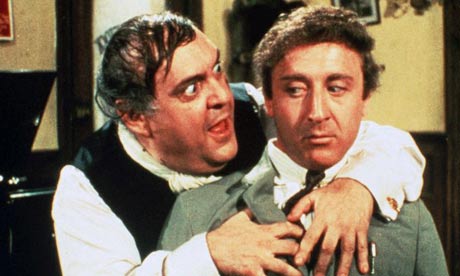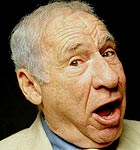The making of The Producers
Mel Brooks takes Damon Wise through milestones in the making
of his equal-opportunities offender: a tuna sandwich-spitting funny script about
high-kicking Nazis, almost scuppered by an over-effusive Peter
Sellers

It almost didn't happen ... Zero Mostel and Gene Wilder in The
Producers (1968). Photo: Kobal
Mel Brooks is 82 now. In the 40s he fought in the second world war, in the
1950s he pioneered TV sketch writing with The Sid Caesar Show, and in the 1970s
he single-handed invented the movie spoof with Blazing Saddles (1974), a
pastiche of western gags that paved the way for the Airplane! film, the Scary
Movie franchise and recent run of parodies that continues with next month's
Disaster Movie. Nothing this groundbreaking Jewish comedian ever did, however,
has lasted like The Producers, the film he directed in 1968 from a script he
wrote himself and finished on a budget of just $941,000.
- The Producers
- Release: 1967
- Country: USA
- Cert (UK): PG
- Runtime: 87 mins
- Directors: Mel Brooks
- Cast: Gene Wilder, Kenneth Mars, Zero Mostel
There has never been a movie quite like it, in which two theatre producers -
one (Zero Mostel) a sleazy opportunist, the other (Gene Wilder) a wide-eyed
dreamer - raise more money than they need to fund a bad-taste musical about
Hitler that (they think) will be a dead-cert flop, only to find that their plan
backfires and their tax-loss disaster becomes a Broadway hit.
After 23 years of cult success, The Producers made news again by becoming a
New York stage production in 2001, taking 12 awards at that year's Tonys, before
being turned back into a movie again in 2005. This month it turns 40, in a
special-edition DVD that refuses to show its age, still fresh, still funny and
still breathtakingly outrageous. Here, Brooks explains the film's remarkable
journey.
1. Broadway
 'I don't know what kept
'I don't know what kept that movie alive' ... Mel Brooks. Photo: Eamonn McCabe
"I worked for a producer who wore a chicken fat-stained homburg and a black
alpaca coat. He pounced on little old ladies and would make love to them. They
gave him money for his plays, and they were so grateful for his attention. Later
on there were a couple of guys who were doing flop after flop and living like
kings. A press agent told me, 'God forbid they should ever get a hit, because
they'd never be able to pay off the backers!' I coupled the producer with these
two crooks and - BANG! - there was my story."
2. Adolf Hitler
"It was such a delicious scheme, and I said to myself: so what is the flop?
They've got to make a surefire flop, one that simply can't run! But what would
have people packing up and leaving the theatre even before the first act is
over? Well, how about something about Hitler! How about a musical! A gay romp
with Adolf and Eva in the Berchtesgaden! Well, that would certainly send the
Jews flying out of the theatre! So that's what I called my script: Springtime
For Hitler."
3. The orchestra
"I only had eight weeks to get it all in the can, including a big production
number, Springtime For Hitler. I was lucky to have John Morris as my composer.
He'd never done a score before. I said, 'Look, I've written a beautiful song
called Springtime For Hitler. Forget the lyrics. If you sing the lyrics, it's
crazy, but if you just stay with the tune, it's a very beautiful song, all
you've got to do is play variations on that. When we have a sad scene, play it
sad. When we have a happy scene, play it happy.' He said, 'Well, that's a good
start!'"
4. A tuna sandwich
"Sidney Glazier was the only producer who would do this. He'd won an Academy
award for The Eleanor Roosevelt Story, so I knew the guy had good taste, but I
didn't know why he'd want to do this crazy comedy. I went to see him, and he was
eating a tuna fish sandwich, and he said, 'Read it to me.' So I began to read it
to him ... When I got to the part about Springtime For Hitler he exploded. He
was choking with laughter; he came sputtering up from behind his desk and he
said, 'BY GOD, WE'LL MAKE THIS MOVIE!'"
5. Horse racing
"Sidney went to a guy called Louis Wolfson, a rich philanthropist. He also
was a great racetrack enthusiast, so he was a gambler. And when he heard my
idea, he said, 'Oh good, this is getting back at Hitler. You can't bring
dictators down on a soapbox with rhetoric. But if you can make people LAUGH at
them, you've won.' He put up half the money. It cost $941,000 to make. The other
half was put up by a producer called Joseph E Levine, who said, 'I'll do it if
you change the title.' That's when we decided to call it The Producers."
6. Gene Wilder's eyes
"I found Gene in a Bertolt Brecht play called Mother Courage. My wife, Anne
Bancroft, was starring in it, and Gene and I got to be friends. He'd say, 'Why
do people laugh at me?' I said, 'Because you're a funny guy.' He said, 'But I
don't intend to be funny.' I said, 'That's what comedy is all about: having the
audience discover it.' So I said, 'I'm writing this script, and you're going to
be Leo Bloom.' He said, 'Ha ha, that'll be the day!' Then, two years later, I
went back to him. By that time he had become a star, but he read the script and
cried. Gene was nuts. Crazy. I loved Gene, because he was always an inch and a
half away from hysteria. It was right there in his eyes. He was like a trapped
animal and, in The Producers, Max Bialystock is the thing that's trapping him."
7. The Tuesday Night Gourmet Club
"I knew it was always Zero Mostel that had to play Max Bialystock. Who else
would pounce on old ladies to get the last dollar out of them? But Zero wouldn't
do it. Now, in those days I was part of a club called The Tuesday Night Gourmet
Club, and we would meet at Chinese restaurants. It consisted of Speed Vogel, a
clothing merchant and sculptor, and George Mandel, a novelist, who was best
friends with Joseph Heller, and Joseph Heller was very good friends with Mario
Puzo. Speed knew Zero's wife, because they had a loft together where Speed
sculpted and Zero painted, and Speed knew Kate, Zero's Irish wife. He said,
'Kate would love this, we gotta get it to Kate.' So he gave her the script, she
loved it, and she made Zero do it. She said, 'No more sex,' or something."
8. Peter Sellers
"Peter Sellers was a champion of The Producers and he nearly ruined it. It
was about to open in England, and he took out a double-page ad in the Sunday
Times that said, 'This is the funniest and the best picture ever made.' The
critics said, 'Hmm, we'll be the judges of that, thank you.' So I got good and
bad reviews because they decided that they would judge it for themselves and not
just take Peter Sellers' word for it."
9. Frank Sinatra
"I only got one really great review
at the time, and that was, 'No one will be seated during the last 88 minutes -
they'll all be on the floor laughing.' Oh, and someone at Newsweek said it was
best lunatic humour since the Marx brothers invaded the opera. But word of mouth
floated it, and the next year I found myself at the Oscars. Why? I don't know! I
was just lucky. I was up against Stanley Kubrick's 2001! I was up against The
Battle Of Algiers! I said, 'Forget it.' But sure enough, when Frank Sinatra was
giving out the award, he said, 'Best Original Screenplay... Mel Brooks!' I got
up and I took the award and I said, 'I must tell you all what's deep in my
heart, what's really in my heart.' They waited, and I said, 'Ba-DUM ... Ba-DUM
... Ba-DUM ...' And then I left!"
10. The New York Times
"The first review, God bless the critics, was by Renata Adler in the New York
Times. She crucified it. She said it was a lousy picture - not worth seeing. And
when you do a little arts picture like that, you need the Times. You can't
survive without it. I don't know what kept that movie alive! I mean, it wasn't a
Doris Day/Rock Hudson movie! It was definitely bizarre. Who would go see a film
about Hitler and two Jews trying to outsmart their investors? Who cares about
that?"
· The Producers is re-released on DVD on August 25


